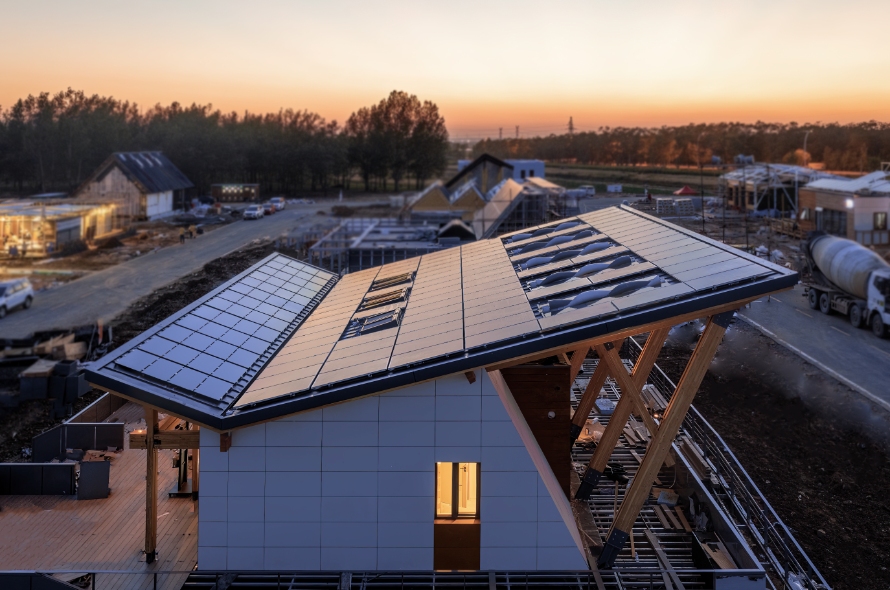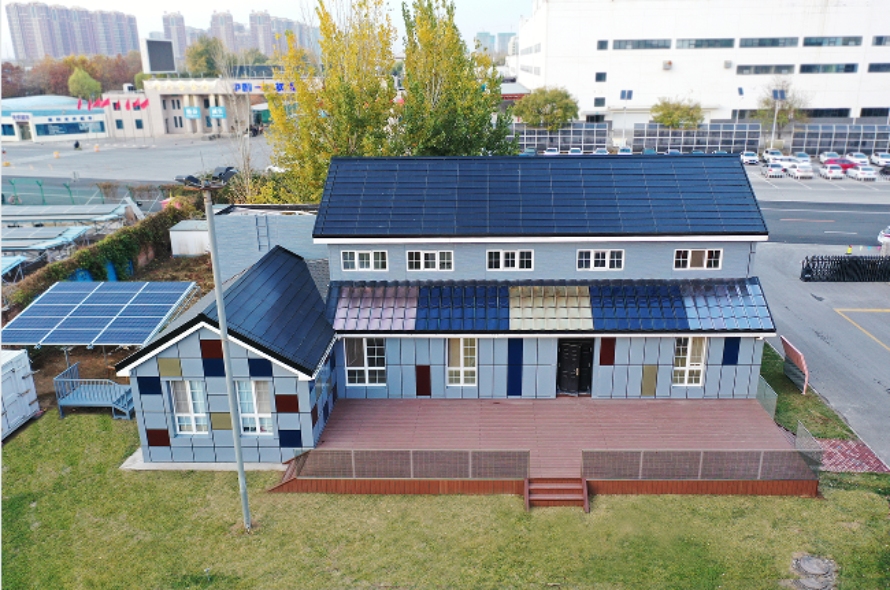Jun. 25, 2025
In the rapidly evolving field of renewable energy, the integration of solar roof tiles with energy storage systems is transforming how buildings generate and manage electricity. This trend is driving the development of innovative “hybrid tiles” that combine power generation and storage in a compact form, offering a true One-Stop System Solution for clean energy at the rooftop level. As more homeowners, architects, and developers seek efficient, aesthetic, and convenient renewable energy options, hybrid solar roof tiles with integrated storage are emerging as game changers.

Traditional solar installations typically involve separate components: solar roof tiles generate electricity, and external battery systems store excess power. However, this separation often complicates installation, increases costs, and reduces the efficiency of energy management. The new generation of hybrid solar roof tiles integrates energy storage directly within the tile, creating a streamlined One-Stop System Solution that simplifies installation and optimizes system performance.
By combining photovoltaic functionality and battery storage into a single product, hybrid solar roof tiles reduce the need for additional hardware and wiring. This integration lowers installation time and cost, enabling quicker returns on investment for residential and commercial users alike.
Hybrid solar roof tiles incorporate advanced lithium-ion or solid-state battery technologies embedded beneath or within the solar cell layers. These batteries store excess solar power generated during the day for use during the night or periods of low sunlight, thus increasing self-consumption rates and enhancing energy independence.
Furthermore, these hybrid tiles connect seamlessly with smart energy management systems that dynamically control the flow of energy—prioritizing self-use, battery charging, or grid feed-in, depending on demand and conditions. This comprehensive approach forms the core of a true One-Stop System Solution for renewable energy users.
Space Efficiency: By integrating storage within the solar roof tiles, the overall footprint of the solar-plus-storage system shrinks dramatically. This is crucial in urban or retrofit scenarios where space is limited.
Aesthetic Appeal: Hybrid solar roof tiles maintain the sleek, low-profile appearance that traditional solar roof tiles are known for, eliminating bulky external batteries or equipment that might detract from architectural aesthetics.
Cost Savings: A One-Stop System Solution reduces labor, hardware, and maintenance costs by consolidating components and simplifying wiring and control systems.
Improved Energy Resilience: On-site energy storage ensures homeowners and businesses can maintain power during outages, reducing dependence on the grid and enhancing energy security.
Scalability: Modular hybrid solar roof tiles allow for easy expansion of both power generation and storage capacity as needs evolve.
Several industry leaders and startups are pushing the boundaries of hybrid solar roof tiles technology, bringing One-Stop System Solutions to market:
Tesla’s Solar Roof V4 incorporates integrated storage cells that complement the solar cells, aiming to provide a seamless hybrid solution with their Powerwall ecosystem.
Gain Solar offers customizable solar roof tiles with optional integrated battery modules, targeting residential and commercial projects seeking aesthetic and performance synergy.
Startups are experimenting with flexible and lightweight hybrid tiles suitable for retrofitting existing roofs, further expanding the potential market for solar roof tiles with built-in storage.
In California, a residential pilot project installed hybrid solar roof tiles with embedded lithium-ion batteries across a 5 kW system. The One-Stop System Solution enabled the homeowner to maximize solar energy use, achieving over 90 % self-consumption and reducing grid reliance by 70 %. The seamless integration simplified installation and significantly lowered upfront costs compared to traditional solar-plus-storage setups.

Gain Solar's residential pilot project in California
In Europe, a commercial building retrofitted with hybrid solar roof tiles demonstrated improved energy autonomy during winter months when solar irradiance is lower. The built-in storage balanced intermittent production, ensuring a reliable power supply without additional battery rooms or complex wiring.

Gain Solar Hybrid Solar Roof Tile Design and Installation Building
While hybrid solar roof tiles offer many advantages, several challenges remain:
Battery Lifespan and Safety: Embedding batteries in roof tiles requires stringent safety standards and thermal management to ensure longevity and prevent hazards.
Manufacturing Complexity: Combining photovoltaic cells with batteries in a compact tile requires advanced manufacturing capabilities, potentially increasing production costs initially.
Cost Competitiveness: Though hybrid tiles reduce some costs, the integration technology itself can be expensive, requiring economies of scale and technological breakthroughs to compete with separate systems.
Maintenance and Repair: Integrating components complicates repairs; a failure in one tile might require the replacement of combined power and storage modules, influencing maintenance strategies.
Addressing these challenges is key to the widespread adoption of hybrid solar roof tiles and One-Stop System Solutions.
The integration trend seen in hybrid solar roof tiles reflects a broader move in renewable energy toward compact, multifunctional, and intelligent solutions. As energy systems become smarter and more connected, the One-Stop System Solution approach will likely expand beyond solar plus storage to include smart inverters, EV chargers, and home energy management—all integrated seamlessly at the rooftop level.
Emerging materials such as perovskite solar cells and solid-state batteries promise even lighter, more efficient hybrid solar roof tiles, further driving adoption and innovation. Governments and utilities increasingly incentivize solar and storage combined solutions, reinforcing the business case for hybrid tiles.
Hybrid solar roof tiles epitomize the future of BIPV, where building elements serve dual purposes: structural and energy generation plus storage. This multifunctionality aligns with sustainable building standards and urban energy goals. The One-Stop System Solution provided by Hybrid Tiles simplifies certification, installation, and monitoring, facilitating faster uptake in new construction and retrofits alike.
The integration of energy storage directly into solar roof tiles marks a significant milestone in solar technology evolution. Hybrid solar roof tiles deliver a One-Stop System Solution that enhances efficiency, aesthetics, and user convenience while reducing costs and installation complexity. Despite current challenges, continued innovation and market demand are driving this trend forward.
For homeowners, architects, and businesses seeking clean, resilient, and visually appealing energy solutions, hybrid solar roof tiles provide a compelling path forward. As this technology matures, the vision of a fully integrated rooftop energy system—power generation and storage in one—is becoming a practical reality, paving the way for a more sustainable and energy-independent future.